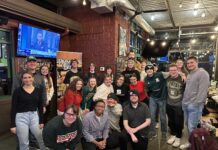There is a new student in class this Fall 2023 semester who may not be too bright or experienced now but may eventually outperform us all.
Artificial Intelligence (AI) chatbots like ChatGPT and Google Bard have sparked classroom debates regarding ethical uses and how the software works. Like many others, The Rocket staff has mixed opinions about AI’s place in education.
The Basics
AI is new and unregulated, which makes it scary, and there may never be any government regulation as Congress has fallen behind in regulating new technology like social media.
Universities may have better luck with regulations. Some professors have already inserted AI clauses into their syllabi or reminded their students how AI can violate academic dishonesty policies if used carelessly.
Outside of education, some staff members enjoy using AI for entertainment by asking it questions like Google or asking it to write funny short stories with wacky details. The staff agrees AI has not been able to replicate human writing yet, so we enjoy seeing what it can create.
The Bad
While AI can gather information very efficiently, it can also lie. Some chatbots learn by mimicking human behavior—meaning we teach them to lie—and others simply get confused when they find conflicting information from multiple sources.
Some staff members also worry using AI in any part of an assignment will get it flagged for plagiarism. Regardless, as journalists, we do not use AI in our writing process to preserve our credibility and relationship with our audience.
AI is far from replicating human writing, but it can replicate editing and take much of the grunt work out of the production process. Many young professionals are creating AI-generated headshots, for better or for worse, that can change the background and leave an individual with an unrealistically perfect complexion. However realistic these may look, the AI cannot replicate life behind a person’s eyes, and the result often looks creepy.
Some staff members have seen AI complete multi-camera editing like in a TV studio. If AI continues to evolve in this way, it could replace digital producers in low-budget productions as its labor will be cheaper and more efficient. This makes us worry that we could become too reliant on AI like we are on calculators or computers.
The Rocket staff does not foresee AI taking our jobs anytime soon, but we see how it has affected the music industry. AI has been able to replicate the voices of music artists to create new songs and collaborations not previously possible. These songs sound the same, or sometimes better, than the artists’ own and could cost them views and revenue.
Like in the music industry, AI can compromise the integrity of art. Any type of art created by AI such as television or photography will lack the human element that shows care and imperfection—traits that help us identify with one another.
Some professors worry about how AI can help students cheat, but students will cheat with or without access to AI, so The Rocket staff does not consider this a significant advantage or detriment.
The Good
AI works best when it is gathering and organizing information from all over the internet, so why not continue that? Any student can easily use AI to brainstorm for a writing assignment, and students studying technology can use it to check code and development software.
AI can also be a useful tool for struggling students by highlighting the most important parts of the material and creating a personalized study plan to keep students on track.
Professors, despite worries of cheating, can also use AI to develop lesson plans and automate other tasks that will streamline their processes as well.
AI further develops every day, and it will get harder to tell what content is machine-generated and what is human-generated. As young professionals, it is important we educate ourselves on emerging technology.






